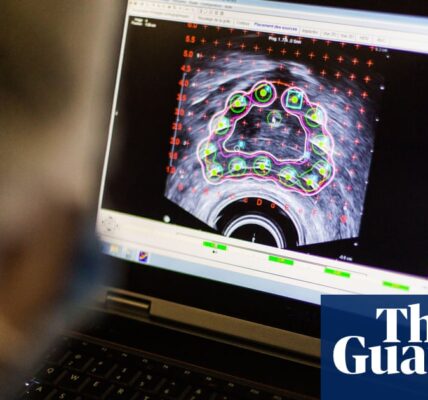
A revolutionary medication that can prevent hot flashes has been given the green light for use in the UK, potentially helping hundreds of thousands of women.
The FDA approved the use of Veoza (fezolinetant) in the US in May, resulting in a green light for the drug.
Approximately 70% of women experiencing menopause are affected by hot flushes, also known as vasomotor symptoms. This sudden and intense feeling of heat can greatly impact a woman’s daily life, including exercise, sleep, and productivity.
For many years, there have been limited safe and successful treatments available for the large amount of women affected. The most effective option is hormone replacement therapy (HRT), but this is not suitable for certain individuals, including those with a past of breast or ovarian cancer, blood clots, or unmanaged high blood pressure. Some women may also experience negative effects or prefer a non-hormonal alternative.
In an interview with the Guardian on Sunday, Julian Beach, the current interim executive director of healthcare quality and access at the Medicines and Healthcare Products Regulatory Agency (MHRA), stated that menopause-related hot flushes and night sweats are a frequent occurrence and can greatly affect a woman’s daily routine. As a result, the MHRA is happy to have approved Veoza (fezolinetant) through their reliance procedure as a treatment for these symptoms.
“We only approve medicines that meet our strict standards for safety, quality, and effectiveness. We also constantly monitor all medicines to ensure their safety.”
The MHRA has announced that Veoza can now be used by women who are going through menopause and experiencing hot flushes. However, it has not been tested for safety and effectiveness in women over the age of 65. Therefore, there is currently no recommended dosage for this age group.
The medication is only available with a prescription and will be released for private use starting January 5th, according to Astellas officials, the manufacturer of the medication. The company has started the application process with the National Institute for Health and Care Excellence to make the treatment accessible through the National Health Service for women.
Astellas stated that the Department of Health and Social Care has not yet approved the price of Veoza, in response to inquiries about the treatment’s cost. In the United States, the price was determined to be $550 (£430) for a 30-day supply.
Veoza is a medication for menopause that does not contain hormones and targets the brain to decrease hot flashes. It functions by inhibiting a brain protein called neurokinin-3, which has a specific function in controlling body temperature during menopause in women.
Marci English, the leader of biopharmaceutical development at Astellas, stated: “The unique way in which Fezolinetant works addresses the underlying cause of moderate to severe vasomotor symptoms in menopausal women. We are pleased to have created a groundbreaking treatment for a condition that has not seen much scientific progress for quite some time.”
Earlier this year, experts commented that the treatment approved in the US could have a transformative effect on hundreds of thousands of women in the UK who are unable to use HRT.
According to Professor Waljit Dhillo, an endocrinologist at Imperial College London, the drug being developed has the potential to be a blockbuster. In 2017, Prof. Dhillo led a groundbreaking trial that set the foundation for the drug’s development. He describes the drug as a “switch” that can eliminate hot flushes within a matter of days. The effectiveness of these drugs is remarkable and has the potential to significantly improve the lives of many women.
A recent extensive study of fezolinetant, released in March, indicated that after 12 weeks of use, it led to a 60% decrease in the occurrence of hot flashes for women experiencing moderate to severe symptoms. This was compared to a 45% decrease in those who were given a placebo. Women also reported that the medication lessened the intensity of their hot flashes and enhanced their sleep quality.
Veoza targets the temperature control pathway and does not serve as a replacement for estrogen, which decreases significantly during menopause. This treatment will not address the various other symptoms that some women may encounter, such as fatigue, muscle weakness, and changes in mood.
According to Diane Danzebrink, a leading advocate for menopause awareness, hot flashes and night sweats are typical symptoms that can significantly impact an individual’s physical and emotional well-being, family dynamics, and professional life. The recent announcement that doctors will now have an additional treatment option to consider, based on each individual’s specific needs, is a positive development. This decision is especially significant for those who have previously felt neglected in terms of available treatments or for those who choose not to use HRT.
Source: theguardian.com


